What’s the Story?
The Coresight Research team is attending Groceryshop 2021 in Las Vegas, which is being held September 19 to 22 in Las Vegas, US. Featuring more than 150 CEOs and over 200 speakers, the event covers the transformation of consumer-packaged goods (CPG), food and grocery.
In this report, we present key insights from day three of Groceryshop 2021.
Groceryshop 2021 Day Three: Key Insights
We have identified the major themes of day three as sustainability and social values. Throughout the day, speakers mentioned these themes as an important facet of corporate strategy, as well as in companies’ relationships with multiple stakeholders—especially consumers and employees. Speakers emphasized that it is not enough for retailers and brands to talk; they must link these broad concepts to specific strategies and material actions backed by communication, data and engagement.
The Regenerative Supply Chain
- Speakers: Viraj Puri, Co-Founder and CEO, Gotham Greens; Peter van Stolk, CEO, SPUD.ca—Sustainable Produce Urban Delivery; Vishwa Chandra, Partner, McKinsey & Company; Julian Counihan, General Partner, Schematic Ventures (Interviewer)
In this session, the CEOs of three companies discussed how to manage tradeoffs necessary within supply chains, focusing particularly on sustainability. One example was the use of climate-controlled regional greenhouses—which offer longer shelf lives but are capital-intensive and require supplemental lighting and cooling, generating carbon dioxide emissions. A Canada-based vendor stated that it is reducing emissions by using electric vehicles but is not tackling the issue of packaging: In Canada, 89% goes into landfills, according to the vendor.
Fresh-food production generates enormous amounts of cardboard waste. Europe has more aggressive packaging regulations in comparison to North America and has instituted many closed-loop systems for reuse and recycling of materials. Across Europe and North America, however, sustainability has expanded into the mainstream, as demonstrated by the proliferation of electric passenger vehicles.
Keynote: How Target Is Standing Out and Gaining Share
- Speaker: Rick Gomez, EVP Chief Food and Beverage Officer at Target
During Target’s mainstage keynote, Gomez stated that inclusivity was critical to the company’s long-term success. He highlighted Target’s Racial Equity Action and Change (REACH) committee, which is committing $2 billion to black-owned businesses by 2025. The company is actively seeking out new partners and pitching Target to potential partners.
Embracing Sustainability: Plotting a Greener Future for Grocery
- Speakers: Zuleyka Strasner, Founder and CEO of Zero (zerogrocery.com); Pradeep Elankumaran, CEO of Farmstead; Laura Burget, Co-Founder of Three Ships; David Marcotte, SVP Cross-Border, Cross-Industry and Technology at Kantar (Interviewer)
Elankumaran discussed how Farmstead, an artificial intelligence (AI)-powered digital micro-grocer, is reinventing the supermarket model with technology that sources and delivers local food from farm to fridge within a few hours. Elankumaran stated that selling in-season local supply to local customers solves many sustainability issues.
Burget spoke to the incrementality of sustainability practices, along with transparency and education. She stated that beauty company Three Ships’ consumers want to know how much plastic their choices have saved from landfill and oceans. “Consumers are waking up and calling out companies for insincere marketing. Own your mistakes; sustainability is a constantly evolving field,” she commented.
Workshop: Creating Authentic Purpose-Driven Marketing Campaigns
- Speakers: Sarah Engel, Chief Marketing Officer and Chief Peoples Officer at January Digital; Dana Medema, VP and General Manager, Oral Care North America, Colgate-Palmolive
Engel and Medema discussed the importance of defining purpose for marketing, its challenges, and working cross-functionally to ensure values and purpose are firmly embedded throughout the organization.
In defining purpose, Engel advised, “Determine what matters to your customers, and not with one survey or the last customer conversation. Use social listening, many surveys, look for sentiment across a constant loop of communication.” She commented on the massive shift in consumers looking for purpose—for attachment to something bigger than the self. She noted that consumers are four to six times more likely to purchase from purpose-driven companies, according to a 2020 study. She closed by stating, “If you are purpose-driven, let your consumer participate with you and leverage the benefits of greater loyalty.”
Medema crystalized executing corporate purpose into three “C” pillars:
- Clarity—Keep the purpose simple so every employee can live and breathe it. From a process standpoint an individual must own the purpose within the organization and ensure it aligns with the senior leadership team, before disseminating across the firm.
- Commitment—Convince the entire organization that purpose must be a commitment. This is where measurement is key. “It is a myth that purpose doesn’t drive business. It has some of the highest ROI,” Medema stated.
- Continuity—Do it year after year after year. Share the vision year-round, as it is how a brand registers in the marketplace. Link the look and feel of the brand to drive continuity.
On environmental sustainability, Medema spoke of Colgate-Palmolive’s responsibility, rather than forcing customers to change their habits—instead changing the composition of its packaging and making sustainability accessible for shoppers. Sharing sustainable solutions with other brands is equally important—Medema noted that working together is the real difference, enabling real change.
Workshop: Implementing and Measuring an ESG Strategy
- Speakers: Alanna Fishman, Managing Director, Corporate Governance and Activism, FTI Consulting; Jessica Edelman, VP Corporate Affairs, Mars Wrigley North America
In this workshop, Fishman and Edelman addressed many of the topics covered by Coresight Research’s
EnCORE framework for sustainability in retail. They commented that companies should just start their strategy: Take an internal assessment of where their company is and where it wants to go, and identify the gap. Many companies are already executing ESG in about 75% of normal business practices, but they have not implemented it through the lens and lexicon of ESG, they argued.
Edelman advised, “bite off small pieces of ESG, there is real long term value creation—both financial materiality and social/societal materiality.” ESG has a language specific and the metrics are evolving—she encouraged companies to learn them and benchmark. She also noted the importance of working with peers for a larger impact. Edelman concluded that sustainability’s merits are based on their global impact—and engaging with government relations is therefore essential.
Keynote: Growing Differently—Food as a Force for Good
- Speakers: Hanneke Faber, President of Foods and Refreshment at Unilever; Deborah Weinswig, CEO and Founder of Coresight Research (Interviewer)
In a late-morning keynote, Weinswig interviewed Faber, who participated via video. Faber noted how Unilever’s sustainability and actionable goals are treated in the same way as the company’s financial commitments. Faber outlined the company’s “Force for Good” commitments as well as the reasoning behind them:
- Nature-positive production—which regenerates the soil
- Produce €1 billion (£900 million) in sales of plant-based food—such as plant-based Hellmann’s mayonnaise and Ben & Jerry’s ice cream
- Halve food waste—Nearly one-third of the world’s food is wasted.
- Double positive nutrition—by adding nutrients to food
[caption id="attachment_133017" align="aligncenter" width="700"]
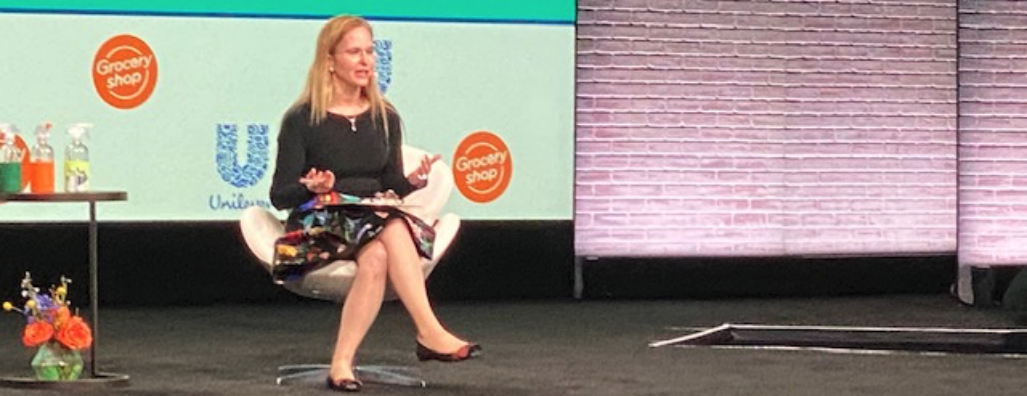 Deborah Weinswig, CEO and Founder of Coresight Research
Deborah Weinswig, CEO and Founder of Coresight Research
Source: Coresight Research[/caption]
Speed, Selection and Scale: How Gopuff Created the Fast-Growing Instant Needs Category
- Speakers: Yakir Gola, Co-Founder and Co-CEO of Gopuff; Joe Laszlo, VP Content, Groceryshop (Interviewer)
Founded eight years ago, consumer goods and food-delivery service Gopuff defined the Instant Needs Category of fast delivery, expanding from 800 stock-keeping units (SKUs) to more than 4,000 today. Gola stated that the company’s concept is constantly evolving and now offers delivery of diverse items such as Covid-19 tests, ice cream, pizza and pet food in 20 minutes, on average.
The company sees its vertical integration as a key competitive advantage, enabling control over both delivery and inventory. It currently has 500 micro-fulfillment centers (MFCs) and 10,000 employees, including drivers. Gola characterized last year’s acquisition of liquor company Bevmo as pivotal, adding a key category and making Gopuff one of the largest liquor-license holders in the US. The company claims it offers a 3:1 return on investment on its advertising platform and a 40% conversion rate for its advertisers.
[caption id="attachment_133018" align="aligncenter" width="700"]
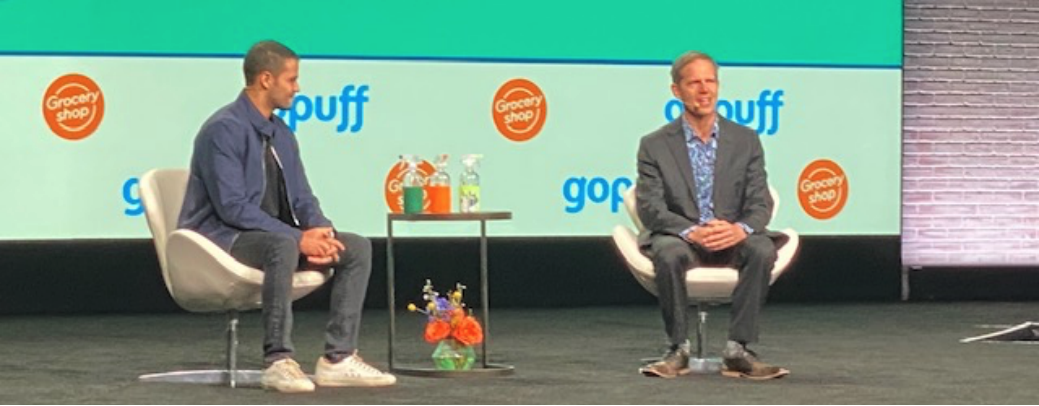 Left to right: Yakir Gola, Co-Founder and Co-CEO of Gopuff; Joe Laszlo, VP Content, Groceryshop
Left to right: Yakir Gola, Co-Founder and Co-CEO of Gopuff; Joe Laszlo, VP Content, Groceryshop
Source: Coresight Research[/caption]
Hey Google, What’s the Future of Grocery?
- Speaker: Carrie Tharp, VP, Retail and Consumer, Google Cloud, Google
Tharp’s session focused on insights witnessed by Google surrounding consumer behavior dynamics with trends in technology. Tharp noted that 66 days are required to form a new habit, meaning many of the behaviors brought about by the pandemic are likely to become permanent.
She commented that Google believes the journey to the future of commerce is easy, intuitive and helpful, and will feature retail that is conversational and not based on website searches. Visual shopping will also contribute—for example, Google may provide a photo of an item for purchase at a store to prevent ambiguity.
Tharp continued by mentioning the luxury of time: that many elements of the current shopping journey require work. In the future, however, she predicts that autonomous delivery will be available and associates will use hands-free tools. Furthermore, data will be intelligently used in all areas—from forecasting to personalized experiences—to take out the work from shopping and put the fun back in.
[caption id="attachment_133019" align="aligncenter" width="700"]
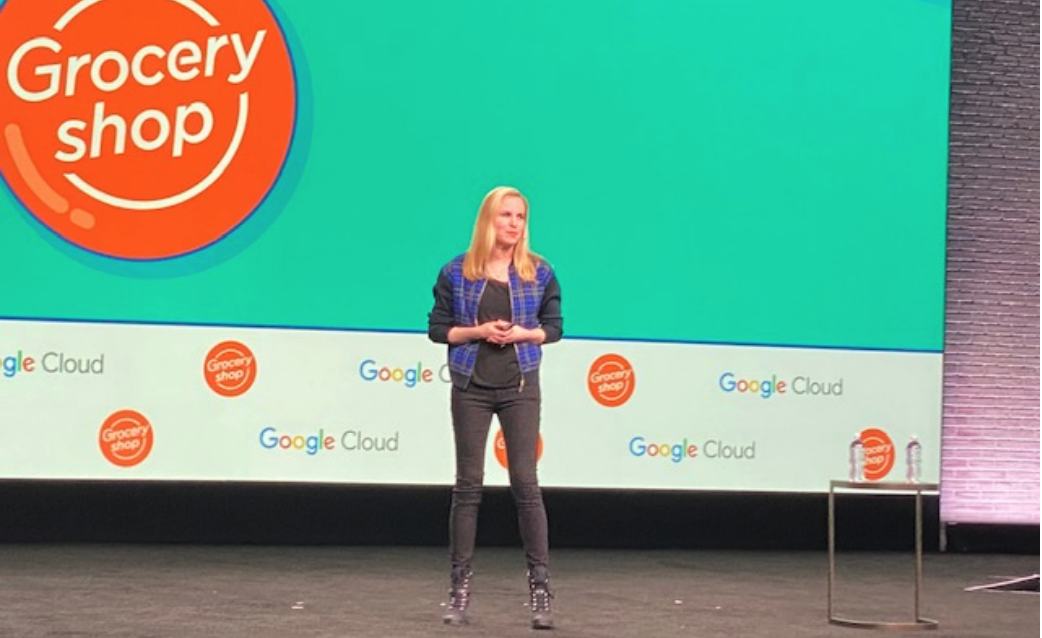 Carrie Tharp, VP, Retail and Consumer, Google Cloud, Google
Carrie Tharp, VP, Retail and Consumer, Google Cloud, Google
Source: Coresight Research[/caption]
The Technologies (Super) Powering Grocery Transformation
- Speaker: Joe Laszlo, VP Content, Groceryshop
In his presentation, Laszlo outlined four imperatives for grocery retail, as summarized below.
- Speed and efficiency: Shopping has been speeding up over time—and the desire to minimize exposure during the pandemic makes speed even more critical. Technologies making shopping faster include delivery tracking, frictionless checkout, location technology for click and collect, personalization, product locators, order updates, scan and go and smart substitutions.
- Sustainability: Topics discussed at Groceryshop this year include energy efficiency, food waste, green transportation and the reduction of packaging.
- Smarts: The retail industry has been talking about data for years, yet it still faces challenges in breaking down silos and creating useful insights. The sheer scale of data available presents many challenges in managing it all.
- Robotics: Technology can be classified as moving data or moving things, and autonomous machines have now emerged. The future use of robots is likely to include human-robot fusions, for example, wearable technology that will assist humans in fulfilment centers.
Laszlo concluded his remarks by commenting that even after the last 18 month’s frenzied technology development, the rate of change has not decelerated—and we should therefore be prepared for an even-faster rate of development in future.
[caption id="attachment_133020" align="aligncenter" width="700"]
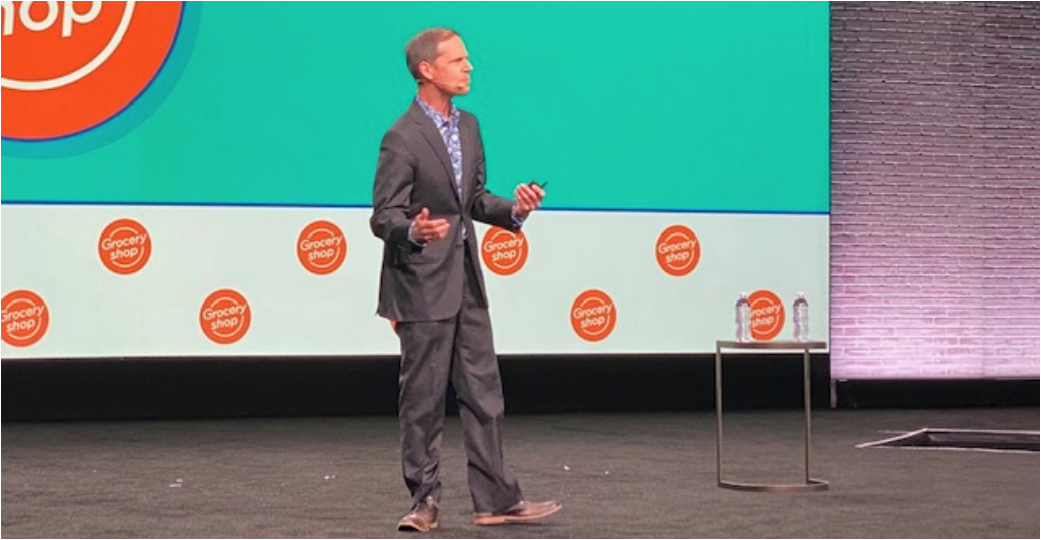 Joe Laszlo, VP Content, Groceryshop
Joe Laszlo, VP Content, Groceryshop
Source: Coresight Research[/caption]
Aligning the Organization To Anticipate Consumer Demand
- Speakers: Amy McClellan, VP, Fresh Merchandising, SpartanNash; Pradeep Elankumaran, CEO, Farmstead; Nathan Mansperger, VP, eCommerce, Southern Glazer’s Wine and Spirits; Rocquan Lucas, Content Director, Groceryshop (Emcee)
In this session, three companies discussed best practices for combining supply chains with marketing, merchandising and other business units to increase sales, profitability and consumer loyalty.
- Farmstead is an online grocery store that offers free delivery in two to three hours within a 50-mile radius. The company has turned its in-house software into a product called GroceryOS, available for other retailers, and has developed a business model that can launch in 14 days.
- Southern Glazer’s Wine and Spirits is the largest US distributor of wine and spirits and sells to wholesalers and retailers. The company stated that it used a technology partner to scrape customers’ websites to harvest data on pricing and availability, aiming to gain a picture of inventory and manage content, pricing and promotions.
- SpartanNash discussed investments in its stores that aim to offer local experiences. It offers homegrown merchandising and highlighted local events such as the annual Hatch Chile Festival. It also discussed methods to link the supply chain and sales, including introducing grab-and-go and prepared food.
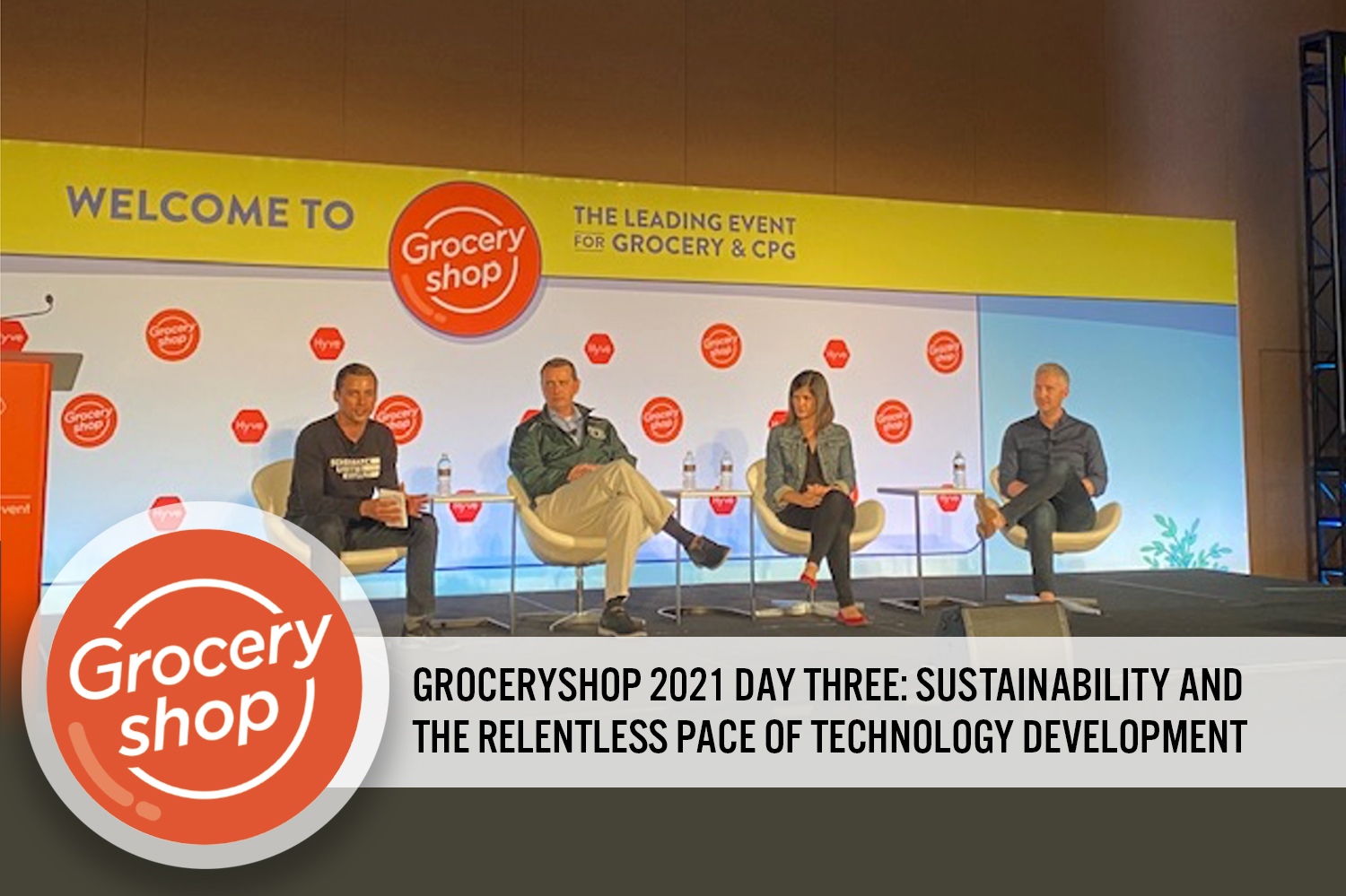
 Deborah Weinswig, CEO and Founder of Coresight Research
Deborah Weinswig, CEO and Founder of Coresight Research Left to right: Yakir Gola, Co-Founder and Co-CEO of Gopuff; Joe Laszlo, VP Content, Groceryshop
Left to right: Yakir Gola, Co-Founder and Co-CEO of Gopuff; Joe Laszlo, VP Content, Groceryshop Carrie Tharp, VP, Retail and Consumer, Google Cloud, Google
Carrie Tharp, VP, Retail and Consumer, Google Cloud, Google Joe Laszlo, VP Content, Groceryshop
Joe Laszlo, VP Content, Groceryshop